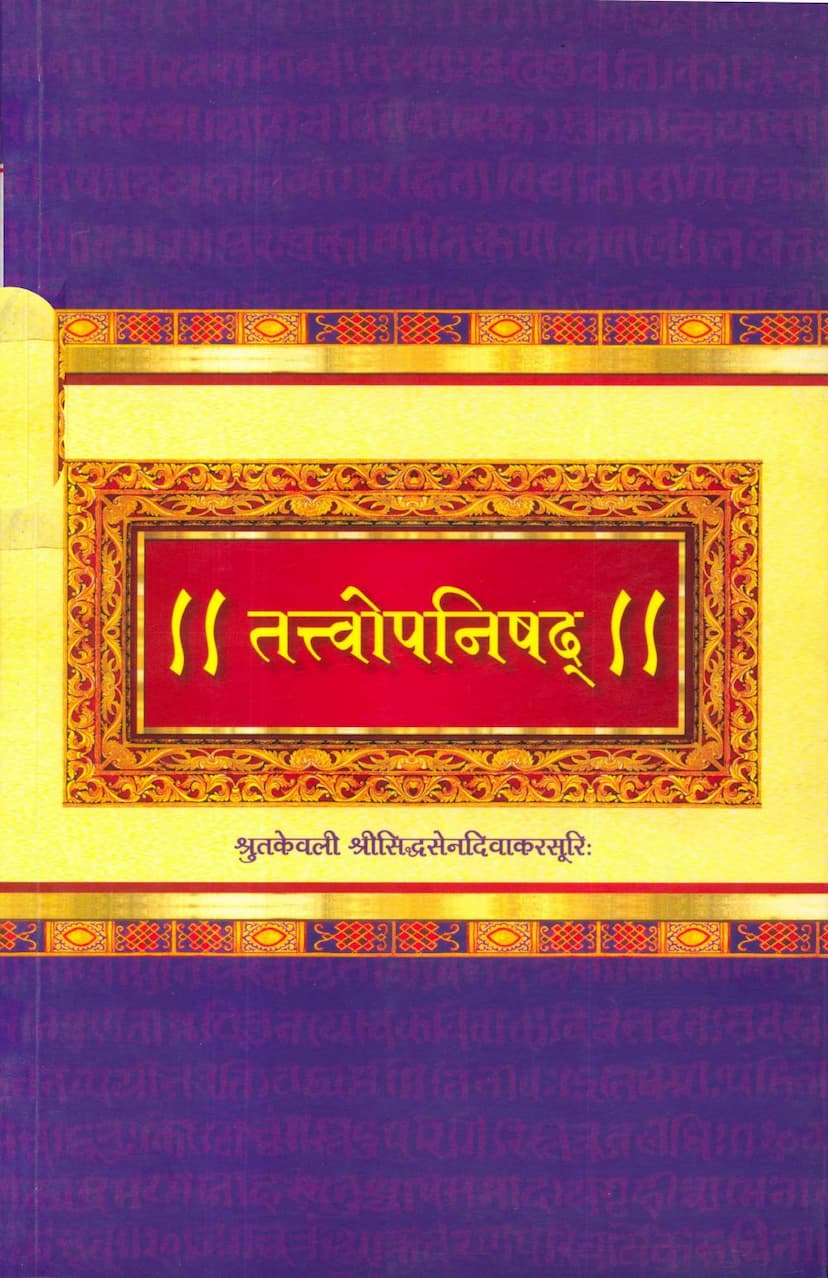Tattvopnishad
Added to library: September 2, 2025

Summary
Here's a comprehensive summary of the Jain text "Tattvopnishad" based on the provided pages:
Title: Tattvopnishad (तत्त्वोपनिषद्)
Author of the Original Work: Shrutsiddhasen Divakar Suri (श्रुतकेवली श्रीसिद्धसेनदिवाकरसूरि), a renowned scholar, logician, and great hymnographer.
Author of the Sanskrit Commentary and Hindi Translation: Acharya Shri Vijay Kalyanbodhi Surishwarji Maharaj (प.पू. आचार्यदेव श्रीमद्विजय कल्याणबोधिसूरीधराः), a disciple of Acharya Shri Vijay Hemchandrasurishwarji Maharaj, who is known for his discourses on detachment.
Publisher: Shri Jinshasan Aradhak Trust (श्री जिनशासन आराधना ट्रस्ट)
Subject: The text is presented as a "Tattvopnishad" (तत्त्वोपनिषद्) which means "Upanishad of Truths" or "Commentary on Truths." It is described as the Sanskrit commentary (Varttik) on the "Shashthi Dwatrinshika" (षष्ठी द्वात्रिंशिका), the sixth of the twenty-one Dwatrinshikas (collections of thirty-two verses) by Shrutsiddhasen Divakar Suri.
Core Message and Purpose:
- Quest for Truth: The central theme is the exploration of true reality, contrasting the personal perception of "my truth" with the objective "truth." It advocates for a profound quest for genuine truth.
- Guidance for a Better Path: The book is presented as an extraordinary text that can provide a turning point in the soul's endless journey through the cycle of birth and death (anadi sansar yatra). Its balanced and unbiased study is believed to be a seed for attaining right perception (samyagdarshana) for anyone in the world.
- Resolution of Disputes: The text is claimed to have the power to successfully resolve disputes.
- Beyond Religious Boundaries: The Tattvopnishad is explicitly stated to transcend sectarian limitations and does not glorify any single religion. It is meant for universal study by anyone with an open mind to create a happier and more prosperous future.
Key Concepts and Arguments Presented in the Commentary:
The commentary by Acharya Shri Vijay Kalyanbodhi Surishwarji deeply analyzes the verses of Shrutsiddhasen Divakar Suri, emphasizing critical thinking and a balanced approach to knowledge. Some of the prominent themes discussed include:
- Critique of Unqualified Intellectualism ("Ashikshit Pandit"): The text strongly criticizes individuals who, despite lacking proper education or understanding, present themselves as learned pundits. It highlights the folly of speaking without knowledge, the arrogance of claiming expertise without substance, and the danger of such opinions gaining acceptance through mere popular belief rather than critical examination. It emphasizes that silence is often the best ornament for the ignorant.
- The Importance of Examination and Reason: The commentary champions the principle of vichar (thought) and pariksha (examination). It argues against blind acceptance of ancient texts or traditions simply because they are old. Age does not guarantee authenticity or correctness. It stresses that uncritical acceptance is a form of self-harm.
- Critique of Blind Faith and Attachment to the Past ("Puratan Prem"): A significant portion of the text critiques the tendency to blindly revere and follow ancient pronouncements without scrutinizing them. It points out that ancient texts often contradict each other, and uncritical adherence to them prevents the discovery of true principles. The author argues that true wisdom lies in examining all doctrines with a balanced perspective, not in blindly adhering to a particular tradition.
- The Nature of True Wisdom vs. Delusion: The text differentiates between true wisdom, which is based on rigorous examination and understanding, and the deluded state of mind that follows ancient traditions blindly, driven by ego, fear, or societal pressure. It explains how people often mistake blind adherence and the propagation of contradictions for scholarship.
- The Role of Evidence and Logic: The commentary emphasizes the need for logical reasoning and empirical evidence (like pratyaksha – direct perception, and anumana – inference) in understanding truths, even those that seem beyond direct sensory perception. It asserts that if a principle is not contradicted by valid evidence, it can be accepted, regardless of its origin.
- The Danger of Argumentation Without Substance: The text details how individuals, when unable to logically defend their own views or refute opposing arguments, resort to attacking the proponents of opposing viewpoints. This is characterized as "Kutarka" (faulty reasoning) and a "Bhava Shatru" (enemy of true knowledge).
- The Ideal of True Scholarship: The commentary paints a picture of an ideal scholar who is unbiased, critically examines all doctrines (including their own), seeks the truth, and is not swayed by ego, tradition, or popular opinion. Such a scholar aims for the welfare of all beings and follows the path illuminated by the teachings of enlightened beings like Lord Mahavir.
- The Search for the "Sarvajna" (Omniscient): The text concludes by urging the reader to seek the truly omniscient being whose teachings are universally beneficial and logically consistent. It emphasizes that the path to this understanding involves studying different philosophies, retaining what is true and logical, and ultimately recognizing the one who is free from all contradictions and passions.
Structure and Content:
- The text is a commentary (Varttik) on the sixth Dwatrinshika of Shrutsiddhasen Divakar Suri.
- It is composed of verses (as seen in the numbered verses like ||1||, ||2||, etc.), each followed by an explanation and commentary.
- The commentary delves into intricate philosophical points, using logical arguments, examples, and references to Jain scriptures and esteemed Acharyas (like Acharya Haribhadra Suri).
- The book also includes dedications and acknowledgments to various scholars, munis, and patrons who supported its publication.
Overall Significance:
"Tattvopnishad" serves as a profound treatise on critical inquiry, the pursuit of truth, and the importance of unbiased reasoning in spiritual and philosophical understanding. It encourages readers to question, examine, and discern the truth, rather than blindly accepting traditions or doctrines. It advocates for a path of balanced wisdom that leads to spiritual liberation and universal welfare.